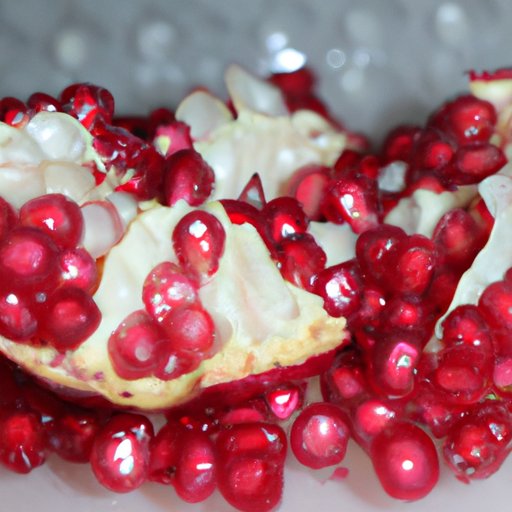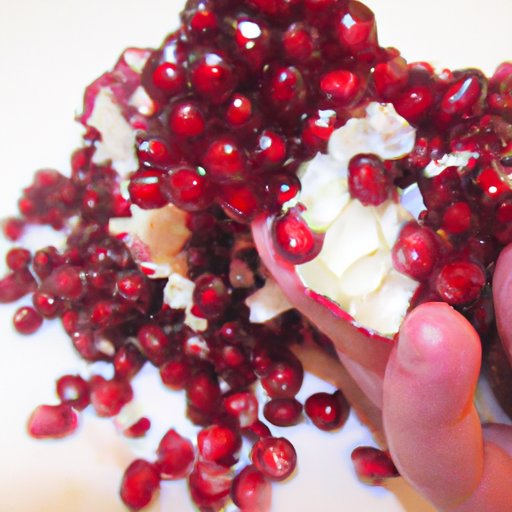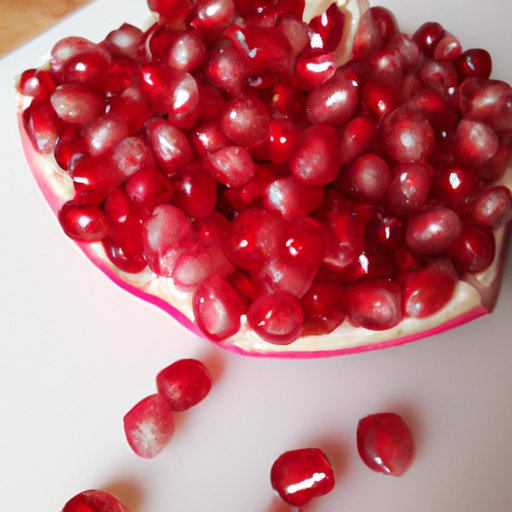Introduction
Pomegranate seeds are the edible seeds found inside the juicy red fruit known as the pomegranate. With a sweet yet slightly tart flavor, these crunchy morsels are packed with vitamins, minerals, antioxidants, and other beneficial compounds. In this article, we will explore whether you should be eating pomegranate seeds, the potential health benefits of doing so, how to properly prepare and eat them, and some recipes to try.

Health Benefits of Eating Pomegranate Seeds
When it comes to nutrition, pomegranates are a powerhouse. Pomegranate seeds contain vitamins A, C, and E, as well as thiamin, riboflavin, niacin, folate, pantothenic acid, iron, magnesium, phosphorus, potassium, copper, and manganese. They are also a good source of dietary fiber and protein. Furthermore, pomegranates are rich in antioxidants, which can help protect against oxidative damage caused by free radicals.
Studies have found that pomegranate consumption may have significant health benefits. For example, one study published in the Journal of Medicinal Food found that drinking pomegranate juice daily for eight weeks improved blood pressure, cholesterol levels, and other markers of heart health. Other studies have found that pomegranate consumption may help reduce inflammation, improve cognitive function and memory, and even help protect against certain types of cancer.
How to Prepare and Eat Pomegranate Seeds
Preparing and eating pomegranate seeds is a relatively simple process. First, cut the pomegranate in half, then hold one half over a bowl and use a wooden spoon to tap the skin side of the fruit. This will cause the seeds to fall out into the bowl. Once you’ve removed all the seeds, discard the skin and any white membrane still attached to the seeds. You can then rinse the seeds under cold water and enjoy them as is or add them to a variety of dishes.
If you find the task of removing the seeds from the pomegranate too cumbersome, there are a few tricks you can use to make the job easier. For instance, you can try submerging the pomegranate halves in a bowl of water and gently rubbing the seeds off with your hands. The water will help keep the juice from splattering everywhere, and the seeds will sink to the bottom of the bowl.

What to Consider Before Eating Pomegranate Seeds
Before consuming pomegranate seeds, it’s important to take certain factors into consideration. People with allergies to other fruits and nuts may also be allergic to pomegranates. Additionally, due to the high concentration of antioxidants, pomegranates may interact with certain medications, such as blood thinners and cholesterol-lowering drugs. It’s best to speak with your doctor before adding any new foods to your diet.

Exploring the Taste and Texture of Pomegranate Seeds
Pomegranate seeds have a unique taste and texture. The seeds themselves are crunchy and slightly chewy, while the juice inside is sweet and slightly tart. The taste of the seeds varies depending on the variety of pomegranate, but generally they are very flavorful. Pomegranate seeds pair well with a variety of dishes, from salads and yogurt parfaits to smoothies and baked goods.
The sweetness of the pomegranate seeds also makes them a great addition to savory dishes. Try adding them to roasted vegetables, grain bowls, or fish dishes for an extra burst of flavor. They can also be used as a topping for ice cream, oatmeal, and other desserts.
Recipes Using Pomegranate Seeds
Ready to get cooking with pomegranate seeds? Here are a few delicious recipes to get you started:
Breakfast Dishes
Try adding pomegranate seeds to your morning smoothie or yogurt parfait for a nutritious start to the day. Or top your oatmeal or pancakes with a sprinkle of pomegranate seeds for a touch of sweetness.
Salads
Pomegranate seeds are the perfect addition to any salad. Try mixing them with spinach, feta cheese, and walnuts for a Mediterranean-inspired dish. Or combine them with quinoa, avocado, and black beans for a healthy and filling meal.
Desserts
For a sweet treat, try adding pomegranate seeds to cakes, cupcakes, muffins, and other baked goods. Or sprinkle them over ice cream or frozen yogurt for a refreshing summer dessert.
Conclusion
In conclusion, pomegranate seeds are a nutritious and flavorful addition to any diet. Not only are they packed with vitamins, minerals, and antioxidants, but they also have a unique taste and texture that makes them a great addition to a variety of dishes. When consumed in moderation, pomegranate seeds can provide many health benefits, including improved heart health and reduction of inflammation. Just remember to check with your doctor first if you have any allergies or are taking any medications.
Whether you’re looking to reap the health benefits or just enjoy their unique flavor, pomegranate seeds are definitely worth trying. So go ahead and give them a try – you won’t regret it.
(Note: Is this article not meeting your expectations? Do you have knowledge or insights to share? Unlock new opportunities and expand your reach by joining our authors team. Click Registration to join us and share your expertise with our readers.)
